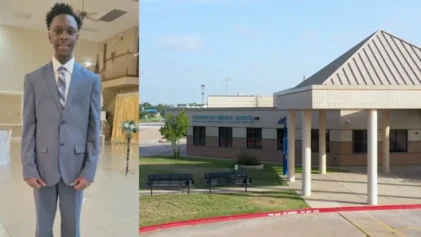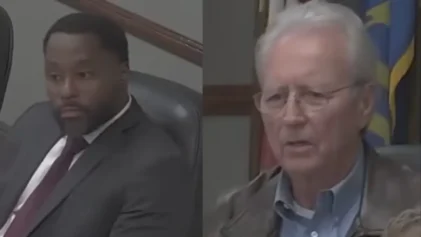“We have seen so much corruption, we’ve seen lawsuit after lawsuit filed against the city,” said Kayla Griffin, first vice president of the Cleveland chapter of the NAACP.
Griffin says the East Cleveland Police Department has kept the Cleveland NAACP chapter busy with numerous complaints lodged against the department.
“Men and women are being gunned down, physically assaulted by police officers, thrown in jail but not processed right so being lost in the system.
When you have high speed chases that go through the city of East Cleveland and come into the east side of Cleveland as well and destroy property and take lives, so at this point we’re like we cannot continue to sit on our hands, we need to call in reinforcements,” Griffin said.
Names like Arnold Black, Tamia Chapman, Redrick Ward and Vincent Belmonte are all linked to the city’s police department’s reputation for excessive force and brutality.
In response to the allegations of corruption and police misconduct, the NAACP sent a letter to the Department of Justice requesting the federal agency step in to oversee the East Cleveland Police Department by obtaining a consent decree.
“What a consent decree does is it puts the city on charge saying, you have to clean this up and allows the federal government to have a say on what’s going on, on the local government,” Griffin said.
A consent decree is an agreement entered as a court order between the Department of Justice and a municipality that is enforceable by the court.
“Consent decrees outline needed changes to use-of-force policies, officer training, transparency, and community engagement. Police departments must comply with the measures for several years before the jurisdiction is released from federal oversight,” as described by Pew Charitable Trust.
“Over the past three decades, the Justice Department has conducted more than 70 investigations of local police departments although the Trump administration did not issue any consent decrees,” Pew Charitable Trust reports.
Griffin says the NAACP was influential in the Justice Department stepping in to oversee the Cleveland Police Department in 2015 after a Department of Justice investigation found Cleveland Police engages in a pattern or practice of using excessive force violating the Fourth Amendment.
The city of Cleveland and the Justice Department entered into a court enforceable agreement to fix problems within the police department and implement police reforms. Activists want the same thing done in East Cleveland.
“It’s clear East Cleveland won’t be able to clean itself up,” said Chris McNeal, an attorney and chief legal officer for the Cleveland Black Lives Matter chapter.
The city of East Cleveland is on the east side of Cuyahoga County, the same county Cleveland is located. It has a population of 13,792 and is nearly 89 percent Black according to the latest Census data.
“I call him Pac Man because that’s what everybody on the street calls him,” McNeal said of Vincent Belmonte, 19, who was killed by an East Cleveland police officer on Jan. 5, 2021.
The Cleveland Black Lives Matter chapter was helpful in drawing attention to the shooting of Belmonte, by Larry McDonald, an East Cleveland police sergeant.
According to an Ohio Bureau of Criminal Investigation report, McDonald pulled Belmonte over after hearing the 19-year-old’s loud muffler. Before McDonald could ask for identifying information, Belmonte fled the traffic stop, leading to a chase.
Surveillance video shows parts of the pursuit, towards the end of the pursuit, Belmonte’s car became disabled and came to a stop, that’s when the 19-year-old ran on foot. The BCI report says Belmonte ran between a pair of houses to jump a fence, but became caught on the fence, that’s when McDonald claimed he saw Belmonte reach for his gun and fatally shot Belmonte.
The community reacted to the shooting with protests led by the Cleveland Black Lives Matter chapter.
“We had heightened senses to really get involved in this case because this is one of many times you had East Cleveland police using as a pretext they’re going to pull someone over because they said the car is reported stolen,” said Kareem Henton, co-founder of the Cleveland Black Lives Matter chapter.
Last October, a grand jury determined McDonald acted lawfully and did not bring any charges, but while Belmonte’s family and community activists believe the shooting should not have been justified, the actions of McDonald come as no surprise to Henton. “Before this incident, he was one that had been involved in numerous incidents,” Henton said.
McDonald is among several East Cleveland police officers named in the letter the Cleveland NAACP sent to the Justice Department. McDonald was also the focus of a WOIO investigation where he was allegedly caught on bodycam video asking for marijuana seized in a traffic stop.
The man in the video said to be McDonald is heard telling another officer, “I’m going to take this weed home, and say look, look, baby, look what daddy brought you.”
“The city of East Cleveland just gave him a little slap on the wrist where he was trying to get drugs out of the evidence room,” Henton said of the alleged incident involving McDonald.
Within the NAACP’s letter, other cases described include Arnold Black being beaten by East Cleveland police detective in 2012, that resulted Black being awarded $50 million dollars by a jury in a lawsuit he brought against the city.
Other incidents highlighted include East Cleveland police officers Torris Moore, Antonio Malone and Eric Jones all were sentenced to prison in 2016 for keeping thousands of dollars from alleged drug dealers, much of it seized through illegal searches and fabricated reports according to the Justice Department.
Griffin hopes with more scrutiny under a consent decree, the East Cleveland Police Department can clean up its act. “Personnel reviews, better equipment, updated trainings and a continuum of training and you have a judge oversees that and mandates implementation,” Griffin said of hopeful outcomes after a Justice Department intervention.
Atlanta Black Star brought the allegations of alleged police misconduct to the East Cleveland Police Department, and East Cleveland Police Commander, Dominique King says the NAACP’s letter comes as a surprise.
“It is a surprise they would not voice their concerns with us to allow us to explain to them our process in dealing with any alleged misconduct from our officers,” King said.
King went on to defend the police department which has 46 full-time employees, and its process for handling officer misconduct, at least under its current leadership.
She says anytime the department is made aware of any alleged misconduct from one of its officers, it launches an internal investigation and if criminal wrongdoing is suspected, outside law enforcement agencies are brought in to investigate which can include the local sheriff’s office up to the FBI.
Atlanta Black Star asked King to comment on Sgt. McDonald being named in the letter and allegedly caught on tape suggesting he would take seized drugs. “They were just allegations and they proved to not withstand the test of investigations,” King said of McDonald’s alleged misconduct after reiterating “we do not tolerate misconduct by our officers.”
Atlanta Black Star also sought comment from the city on the number of pending litigation cases it has stemming from the police department, and the city of East Cleveland responded by saying, “The City of East Cleveland does not keep that information to document the organization, functions, policies, decisions, procedures, operations and/or other activities of its office or offices.”
East Cleveland has a long-standing reputation of being in a state of a fiscal emergency for its handling of its finances, and according to an Office of Management and Budget report released April of 2022, the city is still at financial risk: “In addition to the revenue challenges facing the City, there are a number of legal cases against the City which have exhausted appeals with outstanding damages to be paid by the City and additional cases currently in appeal. These cases present the potential for significant future liability that could further impact the City’s financial solvency.”
“The city of East Cleveland is so poor, they’re essentially judgment proof, meaning that if they violated your constitutional rights in the most clear and egregious manner, you cannot be compensated because they’re essentially insolvent and they cannot pay their debts,” McNeal said of East Cleveland’s financial risks.
Griffin says the DOJ has not responded to the Cleveland NAACP regarding its letter sent to the department in February.


